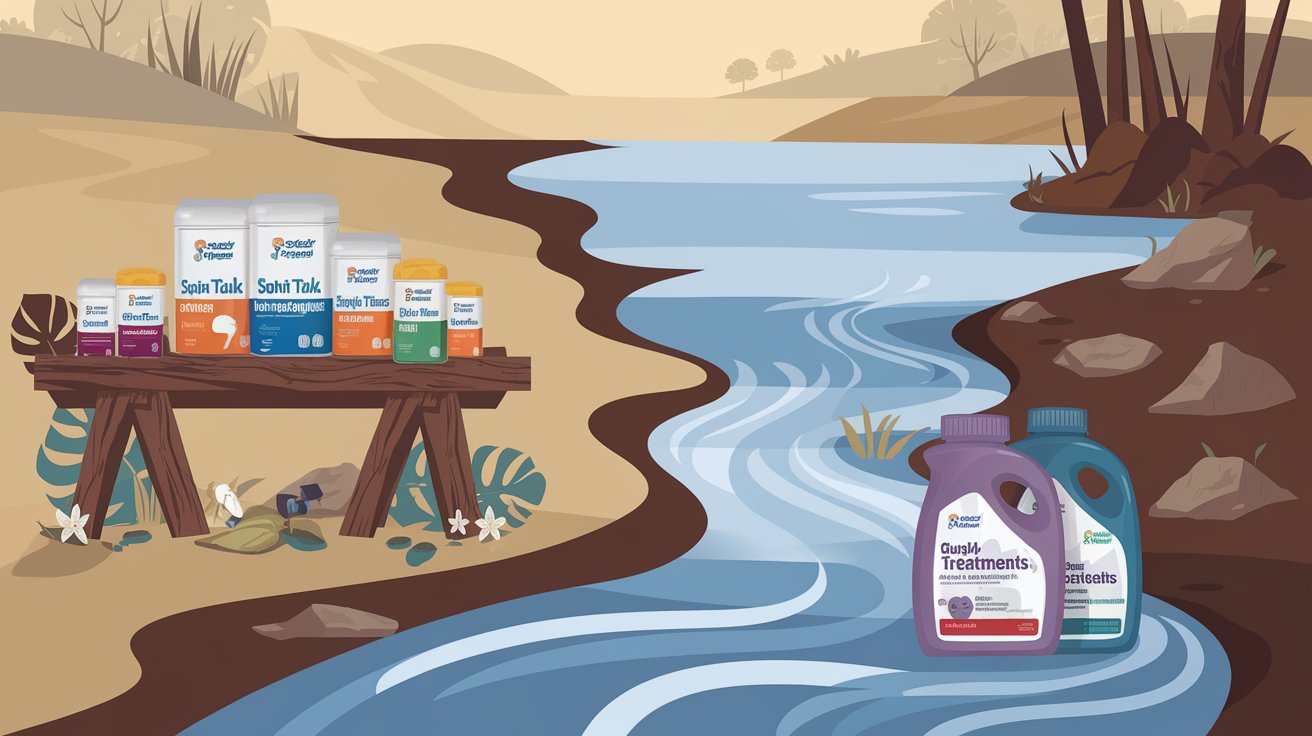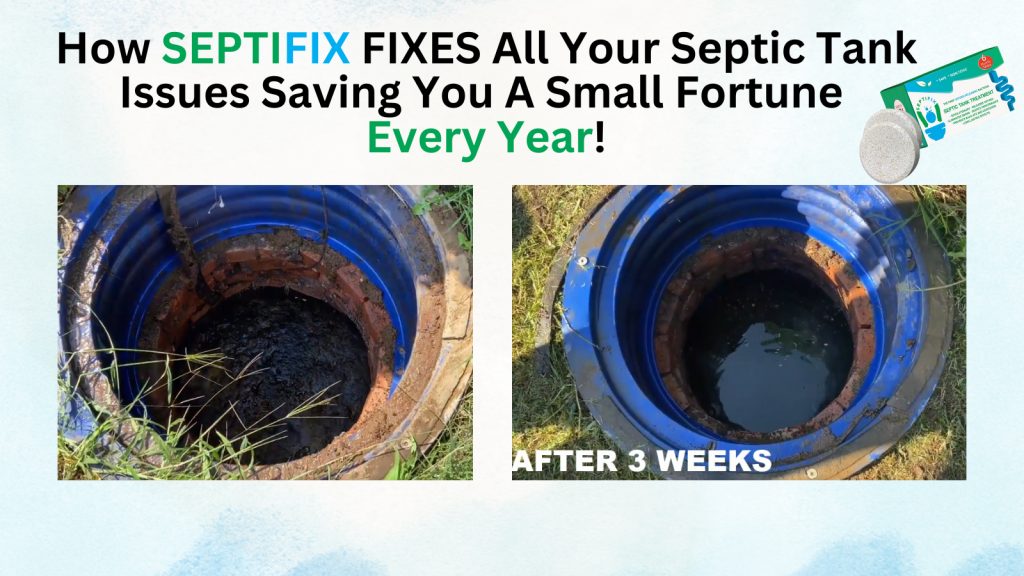When it comes to maintaining a healthy septic system, homeowners often find themselves choosing between septic tank tablets and liquids. These additives promise to boost bacterial activity, prevent clogs, and extend the life of your system. But which one actually works better—and when should you use each?
Understanding the differences between these two treatment types is crucial for anyone who wants to keep their onsite wastewater system functioning smoothly. In this guide, we’ll break down how tablets and liquids work, where they shine, and which is right for your needs.
Table of Content
- How Septic Tank Additives Work
- Septic Tank Tablets: What to Know
- Septic Tank Liquids: What to Know
- Tablets vs. Liquids: Side-by-Side Comparison
- Safety Tips and When to Call a Pro
- Real-World Insights
- Regional Names to Know
- Contact Info and Resources
- Conclusion
- FAQs About Septic Tank Tablets vs. Liquids
- Septifix: Keep Your Septic Healthy
- Septic Permit Links by State
How Septic Tank Additives Work
Septic tank additives—whether in tablet, liquid, or even powder form—are designed to enhance the bacterial breakdown of organic waste. They generally fall into two categories:
- Biological additives: Contain enzymes and live bacteria to support natural waste digestion.
- Chemical additives: Use synthetic compounds to dissolve solids or reduce odors. These are less common and may harm your system if overused.
Both tablets and liquids are typically biological additives aimed at boosting the existing bacteria already doing the hard work inside your tank.
Septic Tank Tablets: What to Know
How Tablets Work
Septic tablets are pre-measured pods or pellets that dissolve slowly over time once flushed or dropped into the toilet. They are designed for long-term, controlled release, often needing application only once a month.
Pros of Septic Tablets
- Easy to use: Just flush one and forget it.
- Consistent dosing: No measuring or mess involved.
- Long shelf life: Tablets remain effective for months.
- Slow-release: Delivers bacteria steadily over time.
Cons of Septic Tablets
- Takes time to dissolve: May not address immediate issues like odors or backups.
- Not ideal for shock treatments: Less powerful in urgent scenarios.
- Less coverage: May not treat the entire system evenly, especially in large tanks.
Best Use Cases for Tablets
Septic tablets are ideal for routine maintenance. If your system is in good shape and you just want to keep it that way, a monthly tablet can be a convenient and effective option.
Septic Tank Liquids: What to Know
How Liquids Work
Liquid septic treatments are concentrated bacterial or enzyme solutions poured directly into the toilet or a drain. Because they disperse quickly, they offer fast-acting results.
Pros of Septic Liquids
- Immediate dispersion: Bacteria start working quickly.
- Great for shock treatments: Perfect for odor issues, backups, or sluggish systems.
- More control: You can adjust the dose based on tank size or severity of the problem.
Cons of Septic Liquids
- Requires measuring: Less convenient than tablets.
- Shorter shelf life: Liquid products may degrade faster.
- Messier application: Risk of spills or overuse.
Best Use Cases for Liquids
Liquid treatments are perfect for new septic installs, septic system startups, or when you need a bacterial boost after pumping. They’re also useful after heavy household usage like parties or guest stays.
Tablets vs. Liquids: Side-by-Side Comparison
| Feature | Tablets | Liquids |
|---|---|---|
| Application | Once a month | Weekly or as needed |
| Best for | Maintenance | Shock treatments, fast activation |
| Ease of Use | Very easy | Requires pouring and measuring |
| Shelf Life | Long | Shorter |
| Effectiveness Speed | Slower | Faster |
| Spill Risk | Minimal | Moderate |
| Cost | Typically lower over time | May be higher depending on usage |
Safety Tips and When to Call a Pro
While septic additives can help maintain your system, they’re not a substitute for regular pumping or professional inspections.
Important safety notes:
- Avoid overusing any additive, especially chemicals.
- If you’re experiencing sewage backups or soggy drain fields, skip the DIY fix and call a licensed septic professional.
- Always read product labels carefully and follow dosage instructions.
Real-World Insights
Many homeowners report that tablets are a set-it-and-forget-it option that supports long-term maintenance, especially in systems that are already well-balanced. Liquids, however, are often favored when quick results are needed—like after heavy system use or to address odors before they become unbearable.
Homeowners in areas with high humidity or limited indoor storage space often prefer tablets due to their longer shelf life and no-spill format.
Regional Names to Know
If you’re searching locally, you might find septic systems referred to by various names:
- Onsite wastewater systems (Midwest and West Coast)
- Drain field systems (Southeast)
- Leach field setups (Northeast)
No matter what they’re called, the function is the same—and these treatments apply across all regional types.
Contact Info and Resources
Here are a few trusted sources and helpful guides:
- EPA’s SepticSmart Program – Tips on septic care and maintenance
- National Onsite Wastewater Recycling Association – Industry updates and professional directory
- OdorFreeSeptic.com Maintenance Guide – Homeowner tips for system upkeep
- [Your County Health Department] – For local codes and inspection requirements
- Local Septic Service Provider Directory – Find help near you
Conclusion
When deciding between septic tank tablets vs. liquids, consider your system’s needs, your maintenance habits, and your desired level of involvement. Tablets are excellent for consistent, hands-off upkeep, while liquids are the go-to for immediate results and system recovery.
No matter which you choose, routine maintenance and proper use are your best tools for keeping your septic system—and your yard—healthy and odor-free.
Need help maintaining your system? Check out our expert guides or find a trusted professional in your area today!
FAQs About Septic Tank Tablets vs. Liquids
What are the main differences between septic tank tablets and liquids?
Septic tank tablets are solid treatments that dissolve in the tank, while liquids are concentrated solutions that can be poured directly into the system. Tablets are often more convenient and have a longer shelf life, but liquids typically provide better distribution and effectiveness in breaking down waste.
Can I use pool chlorine tablets in my septic system?
No, using pool chlorine tablets in a septic system is not recommended. Pool tablets contain trichlorisocyanuric acid, which can harm your septic system and do not effectively disinfect wastewater. Always use EPA-approved calcium hypochlorite tablets specifically designed for septic systems.
How often should I apply septic tank treatments?
The frequency of application depends on the type of treatment used and your household’s water usage. Generally, septic tank tablets may need to be applied monthly, while liquid treatments might require more frequent applications based on their effectiveness and your system’s needs.
Are there any environmental concerns with using septic treatments?
Yes, it’s important to choose biodegradable and environmentally safe products for your septic system. Both tablet and liquid treatments should comply with EPA guidelines to minimize harm to groundwater and local ecosystems.
What should I do if I accidentally used the wrong type of chlorine in my septic tank?
If you’ve used the wrong type of chlorine, such as pool chlorine tablets, remove them immediately from your chlorinator and clean the system thoroughly. Then, replace them with the correct EPA-certified tablets to avoid potential damage or hazardous reactions.
Where can I purchase the right septic tank treatments?
You can find EPA-certified calcium hypochlorite tablets at local home improvement stores like Home Depot or Lowe’s. Additionally, specialized wastewater service providers often sell these products 4.
Do septic tank tablets or liquids work better for older systems?
Liquid treatments may be more effective for older systems due to their ability to distribute evenly and break down waste more efficiently. However, the best choice will depend on your specific system’s condition and needs.
Septifix: Keep Your Septic Healthy










